The Spring 2021 Light Novel Guide
by Rebecca Silverman & Kim Morrissy,Isekai may still dominate the light novel game as presented by English-language translations, but we're certainly seeing more variations on its theme. That's immediately noticeable in the batch of volume ones we're reviewing this time around. Alongside the more traditional stories like Drugstore in Another World, which features an ordinary guy figuring out how to use his unique skill when he's transferred to another world, we have no fewer than three reincarnated-as-the-villainess tales, each with their own spin on things, and two stories about simply being reborn in the character's original world with no isekai factor at all. It can feel like a lot of the same, which makes the books that don't fall into these categories stand out, like the alternate Taisho fantasy Romance of the Imperial Capital and Bofuri, a series you may already be familiar with from its anime version. There may not be quite something for everyone, but there's still a lot to enjoy, from the fluffy to the dark. Stop by the forums and let us know what light novels you're reading or looking forward to!
April
 Ask Iwata: Words of Wisdom from Satoru Iwata, Nintendo's Legendary CEO. Edited by Hobonichi.
$11.99 digital, $22.99 print.
Ask Iwata: Words of Wisdom from Satoru Iwata, Nintendo's Legendary CEO. Edited by Hobonichi.
$11.99 digital, $22.99 print.
Synopsis: Reprints of essays by Satoru Iwata not previously available in English, including the thoughts of those who knew him upon his death.
Rating: (Rebecca Silverman)
Ask Iwata isn't a light novel, or a novel at all, but since the three-month period we're covering in this Guide is somewhat lacking in new series, I thought I'd include it. And while it isn't fiction – it might better be shelved under “business” – it is a fascinating book and a surprisingly good read. The slim volume contains a variety of short essays written by the late Satoshi Iwata, a legendary figure in the game world. While they all pertain to his experiences in the game industry, there's a surprising amount of solid life advice dispensed throughout. Mostly it boils down to things like “respect people” and “don't be afraid to ask for help when you need it,” but the way that Iwata phrases things and the context he puts them in makes these seemingly trite lessons feel much more like hearing them from an old friend or maybe a favorite uncle than like you're getting them from a self-help book. There's also a very real sense of loss when you are reminded that Iwata died, because he feels like someone you know by the end, and the eloquent way that his peers write about him strengthens that. The short snippets at the end of each chapter, little quotes or pieces of advice from Iwata, are some of the best bits in the book, but overall this is just both interesting and good. Even if you have no interest in game development or business, it's worth reading to get to know Iwata.
 Bofuri: Since I Don't Want to Get Hurt, So I'll Max Out My Defense. Story by Yuumikan, art by Koin. Yen On,
$8.99 digital, $12.99 print.
Bofuri: Since I Don't Want to Get Hurt, So I'll Max Out My Defense. Story by Yuumikan, art by Koin. Yen On,
$8.99 digital, $12.99 print.
Synopsis:
IS SHE THE GAME'S LAST BOSS?! Though she doesn't play many MMOs, Maple has either
a natural talent or impossibly good luck, because by pouring every last stat point she has into
Vitality, she's created a character who can't be hurt! Whether it's physical attacks or magic or
status effects, nothing poses a real threat. In no time at all, news spreads across the server about
the adorable terror who can't be defeated. While Maple may just be having fun, her broken build
is sure to attract lots of unexpected attention…
Rating:
(Kim Morrissy)
The thing that sticks out about Bofuri is how darn short it is. I know they're called “light novels,”
but they're not normally this light. This book only takes around two hours to read, and the prose
itself is light and fluffy in a way that feels like it's aimed at younger readers. In fact, it's one of
the few light novels that I would say is genuinely appropriate for a pre-teen audience.
If you've seen the anime, you probably have a good idea what the appeal of this series is. It's a comedy about a first-time gamer accidentally creating an overpowered build for her character due to a combination of the game's unbalanced system and her own obliviousness. The main character might be overpowered, but she's not exploiting cheats or playing for any reason other than her own satisfaction. The humor and low stakes make for a breezy read.
That said, I don't think the writing is quite clever enough to carry the story past the initial concept. There's a certain charm in seeing Maple stumble her way into success, although this only really applies for the first third or so of volume 1. After that, she makes friends who show her the ropes and she starts consciously thinking about how to improve, which isn't quite as fun to read about. Despite the book's brevity, there are dull stretches that are mainly concerned with grinding skills and levels. The light tone and short descriptions keep it all from becoming wearisome, but they also reinforce how insubstantial the overall story is.
For what it's worth, I did enjoy reading this book, but this is one of those cases where I find myself wondering if the price tag is worth it for the amount of content I consumed. If it were longer, or if it had a few more ideas to carry it past the opening, then I'd be comfortable recommending it. Otherwise, I recommend just sticking with the anime.
 Hazure Skill: The Guild Member with a Worthless Skill is Actually a Legendary Assassin. Story by
Kennoji, art by KWKM. Yen On, $8.99 digital, $12.99 print.
Hazure Skill: The Guild Member with a Worthless Skill is Actually a Legendary Assassin. Story by
Kennoji, art by KWKM. Yen On, $8.99 digital, $12.99 print.
Synopsis:
Roland is the world's greatest assassin, but after killing the Demon Lord at the request of the king, he's
ready to hang up his daggers. He's never known the glories of a normal life, and when the king offers
him anything he wants as a reward for doing the job, he asks for just that: normalcy. Somewhat baffled,
the king agrees, and along with his cat (who is actually the Demon Lord robbed of her powers), Roland
embarks on his greatest challenge: convincing everyone that he's just a normal guy.
Rating:
(Rebecca Silverman)
It's a good year for light novel author Kennoji, as this book marks the first of two releases of his work in
English. Like Drugstore in Another World, Hazure Skill focuses on the everyday life of a young man and his female companion, but unlike that other book, this one is a bit more on the mature side. That's
mostly book code for “has more sex in it” (protagonist Roland sleeps with at least two and possibly three
ladies), but it's also due to the fact that Roland is a retired assassin, and he can't quite manage to set his
old profession aside entirely. He desperately wants to, though, because his chief desire in life is to just
be “normal,” something he never had the chance to be before. He was apprenticed to his assassin
master at an early age, trained to be something beyond human, and now in his mid-twenties, he's ready
to see what he's been missing. The biggest problem? He has almost no idea what “normal” means.
One thing he in no way expects is that “normal” is actually different for everyone. He figures out a few of the basics – after he embarks on his quest of normalcy he spends everyday alternating between eating, sleeping, and having sex because that's what he thinks is “normal” until he's reminded that “having a job” is another key component. This leads him to apply to work at the local Adventurers' Guild branch as a receptionist, which in some ways makes this the male-oriented version of The Sorcerer's Receptionist. (This is a bit better written, though.) At the Guild he manages to make a place for himself, and by the end of the volume, he's figuring out what he wants his “normal” to look like. The path there leads him in some unexpected directions, the most shocking of which (to Roland, if anyone ever pointed it out) is that he's actually an incredibly nice guy who goes out of his way to make sure that other people are safe and taken care of. We see this not only when he takes in a little girl he finds starving on the street, but also in the way he helps new adventurers get their feet on the ground and spends time figuring out what everyone can do best. He's a good teacher, a nice person, and so ridiculously overpowered that he has trouble seeing the forest for the trees.
This isn't a grand adventure story. Even the adventures that Roland ends up going on are kind of anticlimactic. But that's what makes this more fun and possibly more appealing to a larger readership than your average slice-of-life book. It's a nice blend of genres if you're looking for something more laid- back but that still has action – and, of course, a talking cat who turns into a sexy demon lady.
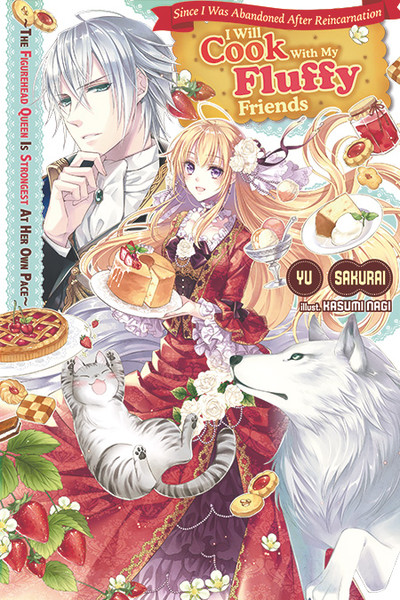 Since I Was Abandoned After Reincarnating, I Will Cook with My Fluffy Friends: The Figurehead Queen
is Strongest at her Own Pace. Story by Yū Sakurai, art by Kasumi Nagi. Cross Infinite World, $7.99 digital.
Since I Was Abandoned After Reincarnating, I Will Cook with My Fluffy Friends: The Figurehead Queen
is Strongest at her Own Pace. Story by Yū Sakurai, art by Kasumi Nagi. Cross Infinite World, $7.99 digital.
Synopsis:
When her fiancé the crown prince throws her out, the shock of being pushed into a fountain startles
Lady Laeticia into remembering her previous life as a corporate drone in Japan. Since she's already
realized that Prince Fritz is really not worth her time, she's content to let him dig himself into a political
hole by not only renouncing their engagement in favor of scheming commoner Sumia, but also to be
banished. It isn't perfect, but now she'll have time to return to her previous life's hobby of cooking – and
if she has to become the figurehead queen of another nation to do that, well, at least she'll also get to
indulge in her love of dogs with the royal wolf pack. A life with homemade strawberry ice cream can't be
all bad!
Rating:
(Rebecca Silverman)
I Will Cook with My Fluffy Friends (that title desperately needs shortening) is an interesting combination of two distinct light novel genres: the reborn-as-a-villainess story and the isekai cooking tale. Those sit together much more comfortably than you might think – Laeticia, the heroine, isn't really a villainess, but rather is being cast as one by a rival ducal family looking to overtake her own in power, and if the prince she's engaged to wasn't such a fool, he'd be able to see that. But since her hobby back in her previous life was cooking, something she can't really indulge in as a duke's daughter, she's not terribly upset by the change in her circumstances, especially since her meeting with Truck-kun came before she got to eat the strawberry ice cream she'd made. That her death also took her away from her beloved elderly Shiba Inu Jiro is more of a blow once she regains her memories, but since her father's plan for the family to save face (and keep Laeticia safe) involves a marriage to the young king of a nation with a royal wolf pack, things really do work out quite nicely. Now Laeticia can befriend fuzzy animals and cook in perfect peace.
In part this is because she's only the temporary, figurehead queen while the king tries to buy some time before having to choose between the four warring factions within his own kingdom when he picks a bride, so Laeticia gets to live apart from him, which suits her just fine. (She's unaware she's getting royal visits in his secret wolf form, naturally.) It's already clear that the king's not just going to let her go after the two years are up, and that sets up an interesting potential love rivalry, because Ilius, the son of that same rival ducal family back in Laeticia's home country, was actually planning to use Sumia's assumption of Laeticia's place as the prince's fiancée in order to marry Laeticia himself, not because he's a jerk (although he may be), but because he likes her. While the plan going sideways worked out for Laeticia, Ilius is far from happy, and there's some sense that he's not just going to sit back and go along with his father, the idiot prince, and the unpleasant Sumia for much longer. This is honestly just a fun story, with equal amounts of political intrigue, furry pet snuggling, and cooking, and I'm hoping that we don't have to wait too long for volume two.
May
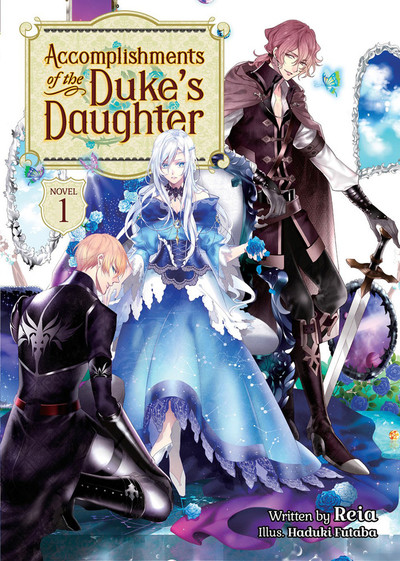 Accomplishments of the Duke's Daughter. Story by Reia, art by Hazuki Futaba. Seven Seas, $9.99 digital.
Accomplishments of the Duke's Daughter. Story by Reia, art by Hazuki Futaba. Seven Seas, $9.99 digital.
Synopsis:
Iris, an otome game addict with no time for romance, gets hit by a truck after getting out of work–but instead of dying, she finds herself in the world of a game she'd played just hours earlier. However, she's not reborn as the game's protagonist, the main heartthrob of the harem. Instead, she starts her new life as the antagonist, right at the moment she's being sent to live in a nunnery–for the rest of her life.
Rating: (Rebecca Silverman)
Come for the story of a woman reborn as a villainess in her favorite otome game, stay for the economics lessons! Seriously, if you were a fan of the economic aspect of Spice & Wolf, it's worth checking out the original light novels of Reia's Accomplishments of the Duke's Daughter for that element of the story alone – Iris' redemption relies heavily on her past life as an accountant in a tax office. And even if you don't find economics fascinating, it's still very nice to see a woman rely solely on her brains to get herself out of the mess she finds herself in. Iris awakens to her past life memories just as things are about to go south for her in the world of her favorite otome game, but fortunately in enough time for her to quickly work with to salvage the situation. She fully acknowledges that her behavior as Iris has been dreadful, then uses the other characters' behavior against them, managing to tar everyone (herself included) with the same brush, similarly to how Laeticia's awakening works a few entries above. In this way, Iris manages to avert the worst of the villainess' fate, and she gets herself “banished” by a sympathetic father back to the family's remote estate, where she's to serve as the acting ruler of the province.
What's striking about this book as opposed to so many others in the same vein is that it's made clear that Iris may not have remembered her past life until recently, but she's always been herself, rather than the original Iris from the game. We see this in the way she asked her father to take in orphans from the slums in lieu of gifts, in the kind way she interacted with them, and the loyalty and friendships she inspired. Now as the ruler of the family duchy, she's able to rely on the people she's always known and treated well as well as her past career; her memories simply enhance how she acts rather than changing it completely. Interestingly her workaholic tendencies from Japan's corporate culture also show up, and unlike some other protagonists, she doesn't see those as a bad thing or as having contributed to her untimely demise in the past. (It was, we're told, a traffic accident unrelated to work.) Instead, Iris and those around her see it as part atonement, part excellent political move for her to be so engrossed in her work, and while it may not be healthy, it is something that helps the book to stand out in its field.
It's worth noting that this is distinctly less romantic than most other light novels in the same vein. There is a romance subplot being hinted at (and mildly spoiled in one illustration), but the heart of the book is Iris reforming a feudal duchy into a modern capitalist society. It's dense but fairly well-written and worlds above its manga adaptation, which preceded it in English translation. If you're tired of mushy novels and want something a bit more serious, or you just really like people learning what banking is, this is worth checking out.
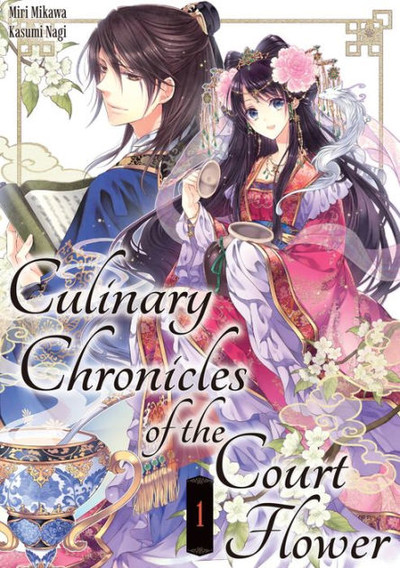 Culinary Chronicles of the Court Flower. Story by Miri Mikawa, art by Kasumi Nagi. J-Novel Club, $6.99
digital.
Culinary Chronicles of the Court Flower. Story by Miri Mikawa, art by Kasumi Nagi. J-Novel Club, $6.99
digital.
Synopsis:
Rimi has spent most of her life making food for the protector god of the land. She is suddenly
sent as a tribute to the great empire of Konkoku, becoming one of the emperor's concubines. She
comes close to losing the taste of her home country, but she is saved by the cuisinologist Shusei.
As she dreams of a reunion with the kind scholar, she does her best to survive in the envy-filled
rear palace with the help of her natural cheerfulness and her skill as a cook. Then out of nowhere,
she is arrested and sentenced to be executed on the charge of disrespecting the emperor! How
will Rimi get out of this mess? Find out in this China-inspired fantasy story about a princess and
her love for food surrounded by gorgeous men.
Rating:
(Kim Morrissy)
Culinary Chronicles doesn't have the same deft writing and down-to-earth appeal as The Apothecary Diaries, but it's still an interesting court drama about a plucky girl finding a place of her own in fantasy China. It helps that the food aspect is more interesting than usual for light novels with that theme; instead of introducing your usual mayonnaise and other modern dishes to a European fantasy world, the focus is firmly on historical Japanese and Chinese foods.
Much of the appeal in Culinary Chronicles is in the blending and clashes of culture. In the opening scene, Rimi causes trouble because of language misunderstandings, and this is a recurring theme throughout the book. I appreciated details like her struggling with vocabulary and translating words literally from her native language, making her accidentally come across as too direct and rude; this felt very true to life. The food discussions also fit this theme, sometimes in clever and ingenious ways.
On the other hand, the book does have the common light novel problem of repetition and constantly explaining what the characters are thinking and feeling. It ultimately feels like padding to make the story fit the typical bunkobon novel length. The plot does eventually come together in a satisfying way, but the early chapters definitely could have been trimmed for brevity.
At least in this first volume, the fantasy elements are limited, mostly existing to allow for character interactions that would have felt implausible in a more rigid historical setting. There's a sparkling shojo feel to the character designs and writing, with all the male characters fitting the usual archetypes. I recommend it most for shojo fans who want a taste of historical East Asia and food culture rather than the other way around, as the storytelling may be a little half-baked for those craving a deeper exploration of the setting.
 Drugstore in Another World: The Slow Life of a Cheat Pharmacist. Story by Kennoji, art by Matsuuni.
Seven Seas, $9.99 digital, $13.99 print.
Drugstore in Another World: The Slow Life of a Cheat Pharmacist. Story by Kennoji, art by Matsuuni.
Seven Seas, $9.99 digital, $13.99 print.
Synopsis:
Frustrated with his dead-end job and life, Reiji suddenly realized one day that he was transported to an
alternate world. The skill he picks up there is the skill of making medicine. He is disappointed not to have
a combat skill, but the potions he makes become popular overnight, and he opens a drugstore with the
money he accumulated. And so, Reiji enjoys a slow life made possible with his skill, catering to clients
who come to his store.
Rating:
When the synopsis says Reiji “suddenly realized” he was transported to another world, it means it – the
book opens with Reiji shifting from our world to a fantasy realm mid-step. It's not great world building,
but it gets the job done, and really, that may be the best way to sum up the entire book. It's not about
the journey or the magic, or even the fact that Reiji has been isekai'd away to a fantasy realm. Drugstore
in Another World is about the everyday activities of Reiji and his friends and neighbors in the small forest
village he moves to, a slow-paced, calm, slice-of-life story. There's a gentle formula to the whole thing:
in each chapter, someone comes to Reiji's pharmacy (pharmaceuticals being the skill he acquired when
he transferred worlds, along with the ever-important ability to see stats), they ask him for something, he
thinks about their problem, solves it, the end. There are stickier moments, such as when his aphrodisiac
gets into the wrong hands or when a dragon pees on people, but for the most part, it's just calm.
Needless to say, that means that this is not going to be a hit with everyone. I did find it a little dull in places, and the characters are all very familiar in that tropey way (although Noela is one of the cutest werewolves I've ever encountered), and there also isn't a ton of plot cohesion. Characters do reappear from time to time, but it isn't in the service of a grand plot or anything; it's more that in a small town you run into the same people most days. There is a lovely straightforward quality to the writing and the story that lets us know that Kennoji isn't winking and nudging towards any deeper plan, but it really is, on the whole, kind of boring. But it's a pleasant boring, and there's definitely something to be said for that.
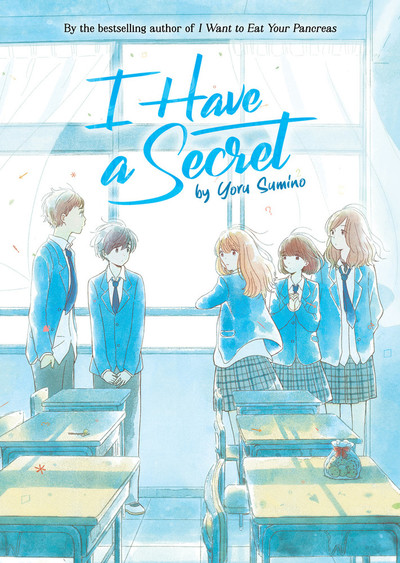 I Have a Secret. Story by Yoru Sumino. Seven Seas, $9.99 digital, $14.99 print.
I Have a Secret. Story by Yoru Sumino. Seven Seas, $9.99 digital, $14.99 print.
Synopsis:
Five high-school classmates hold secrets close to their hearts–hidden talents, unspoken feelings, and
buried pain. As they collide with each other on the path to growing up, they might just jostle some of
those secrets free.
Rating:
(Rebecca Silverman)
The latest of Yoru Sumino's novels to be translated into English is also the weakest. Largely this is
because the stakes are much, much lower than in I Want to Eat Your Pancreas, At Night, I Become a
Monster, and I Had That Same Dream Again; the thrust of the story is whether or not two members of a high school class end up together. And while it does have Sumino's trademark supernatural element,
this, too, is more subdued than in their other works: each of the five characters can see human emotions visually represented in some way. These range between a numerical count of heartbeats, card suits or punctuation above people's heads, a see-saw representing positive and negative feelings, and arrows directed towards the person they like. Each of the five characters have a chapter in their first person voice, ostensibly to give us a better picture of who everyone is and what they're thinking about and feeling, but this falls flat due to the fact that Sumino isn't great at giving each character a distinct voice, something that is required for a literary device like this to work. The one positive here is that each character discusses a different point in the school year, so there's no repetition on the plot front.
I Have a Secret is clearly trying very hard. It wants us to believe in the love geometry between the characters, in each of their quirks and differences, and to be invested in their futures. But trying hard doesn't always mean that the story will succeed, and not only is it difficult to tell the characters apart from their narration, there are also too many holes left gaping between them – we never really understand why Zuka's see-saw is so steady or when Miki shifts from liking Zuka to someone else, and I never feel like we get a grip on Looney as a person at all. It's almost a more disappointing read because it's so clearly striving towards a point it never hits, its potential as unrealized as its characters' crushes.
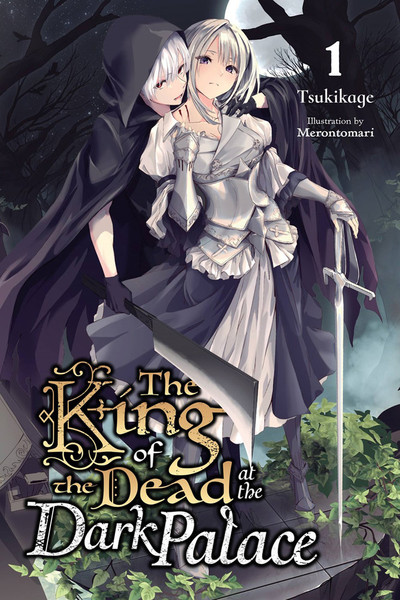 The King of the Dead at the Dark Palace. Story by Tsukikage, art by Merontomari. Yen On, $8.99 digital,
$15 print.
The King of the Dead at the Dark Palace. Story by Tsukikage, art by Merontomari. Yen On, $8.99 digital,
$15 print.
Synopsis:
When a sickly boy succumbs to illness only to awaken as a lowly undead named End, his initial
reaction is not horror but joy. No longer weak and bedridden, he is eager to experience the
freedom of a properly functioning body. Sadly, his delight is cut short when he realizes the
shackles of his previous life have simply been replaced by new ones—specifically, the powerful
necromancer who revived him. To gain true freedom, he'll need to overcome the many obstacles
in his way… starting with his dark master!
Rating:
(Kim Morrissy)
A classic survival story, but with undead trappings. The King of the Dead at the Dark Palace
stands a cut above other light novels featuring an undead protagonist by focusing almost entirely
on the distinct ways in which the undead are vulnerable. There's a harrowing feeling throughout
the entire book which never lets up for even a single moment.
The protagonist End makes a fitting protagonist for the tale. He is unusual among the undead for retaining his memories of when he was alive, but in certain ways that makes him even more of a monster than his mindless counterparts. He is able to keep secrets and manipulate people's emotions, and yet throughout it all his sheer determination to survive outweighs any actual malice or ambition. Ironically, it's his self-preservation instinct that makes him both sympathetic and horrifying; just from this volume alone you can see his potential to become the sinister “King of the Dead.”
The book moves along at a nice pace. It is slow and deliberate at first, as End gradually becomes accustomed to the nature of his current body and the circumstances which limit his freedom. There's a claustrophobic feeling in this part because End has absolutely no one to talk to, and so most of the prose is dedicated to internal thoughts and plotting. That might try a reader's patience, but the limited perspective builds the tension effectively. Then, after a turning point, the action starts to escalate consistently, and it becomes a gripping page-turner.
Although this book is based on an ongoing web novel, I felt like it told a solid standalone story. The worst part of the book is the extraneous extras, which exist either to regurgitate exposition from earlier in the narrative or to shoehorn some ill-fitting jokes. Ultimately, the novel wraps up neatly and I don't feel particularly compelled to spend more time in its world, for better or worse.
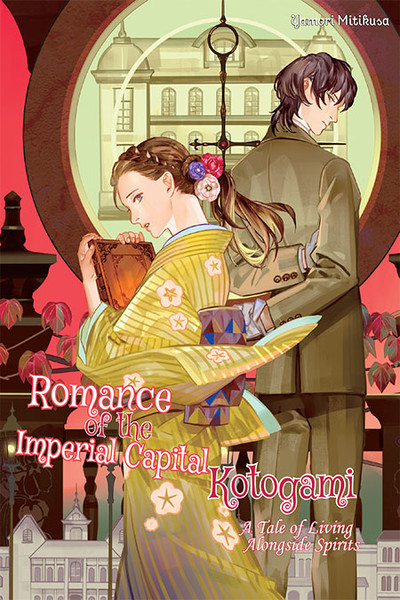 Romance of the Imperial Capital Kotogami: A Tale of Living Alongside Spirits. Story by Yamori Mitikusa.
Cross Infinite World, $7.99 digital.
Romance of the Imperial Capital Kotogami: A Tale of Living Alongside Spirits. Story by Yamori Mitikusa.
Cross Infinite World, $7.99 digital.
Synopsis:
In an alternate version of the Taisho period, yokai not only move among humans, but they can also be
enshrined (or trapped) within special books known as kotogatari. Once inside one of these books, they
are known as kotogami, and only a reading by a Narrator, a yokai specialist, can free them – and only a skilled Narrator can control them. Akari, a young woman living and working in the Imperial Capital, has
no fondness for spirits or stories, but nonetheless finds herself involved with them when a yokai burns
down the company dorm she lives in. Taken in by a strangely self-sufficient spirit named Tomohito, Akari
finds herself living in a Bookhouse owned by the military, which naturally leads to her involvement in all
things kotogami – including the mystery of her own past.
Rating:
(Rebecca Silverman)
There's a lot that's interesting about the world created in this one-shot novel. The part that stands out
the most is of course the idea of kotogami and kotogatari: the former are yokai who are enshrined
within the latter, a sort of magical book. These are managed by Narrators, a branch of the military that
has basically weaponized storytelling, but in a non-propaganda way. Although it isn't developed, the
implication is that this is a way for humans and the magical to coexist relatively peacefully, although it
seems like it might not be a great deal for the kotogami. That's where I wish we'd gotten a bit more
world building, because there are definite themes of not only history being written by the victors, but
also of what happens when governments get involved with native populations. The whole idea of
writing and the connections between fiction and history is more important to the plot, because heroine
Akari isn't a fan of fictional works but does love history. Since the powers attributed to a given kotogami
come from what's written in their book, a spirit could easily be warped by someone rewriting their
truths, which is really where Akari comes in.
Not that she's all that keen on it, mind you. Akari is one of the more abrasive heroines in the novels covered here, although she certainly comes by it honestly. She's got trauma surrounding both kotogami and fiction (folklore, specifically), so when her dormitory burns down and she's rescued by a very enthusiastic kotogami named Tomohito, the last thing she wants to do is go with him. Since she has no choice, she does, and over the course of the novel we see her getting more comfortable with both Tomohito and the idea of Narrating kotogatari if she needs to – and absolutely not being willing to admit any of that to him. This is probably the point where we should remember that historically the word “romance” denoted what we'd call the fantasy genre today, and that's definitely how it's being used in this book's title. You can certainly infer a romance in the modern sense if you want to, but it's really the least important part of the story.
This is a much denser read than most of what Cross Infinite World publishes, which is by no means a bad thing. But if you're in the mood for something light and fluffy, this is not the book to pick up. It's still good and definitely interesting, not to mention screaming for a softer sequel, but it has things that it wants to say, even if it doesn't fully develop them. I enjoyed it, but it's the sort of book that you need to be in the right mood for.
June
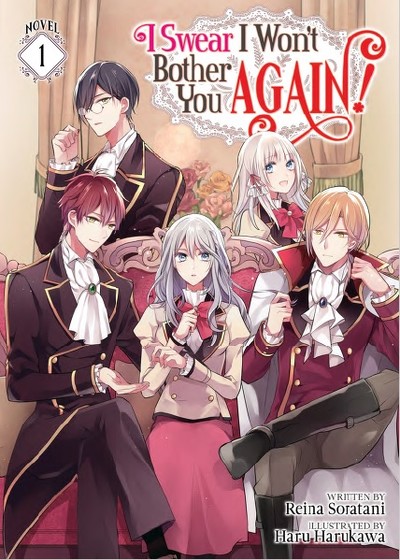 I Swear I Won't Bother You Again! Story by Reina Soratani, art by Haru Harukawa. Seven Seas, $9.99
digital, $14.99 print.
I Swear I Won't Bother You Again! Story by Reina Soratani, art by Haru Harukawa. Seven Seas, $9.99
digital, $14.99 print.
Synopsis:
Violette made a mistake – she committed a terrible crime against her younger half-sister Maryjune, and
now she's in prison, awaiting her punishment. Thinking back on how things went so wrong, she wonders
how she would do it differently were she given a second chance…and suddenly she realizes that she's
gotten her wish. Or at least one of them, because if Violette attacked Maryjune, it wasn't without
provocation. The neglected and abused daughter of her father's first marriage, Violette has felt
unwanted all her life, and when her father remarried his mistress and brought her and Maryjune into
Violette's home (from which he had been absent for most of her life), she was pushed into oblivion. Is
preventing her mistake really the reason why Violette has been given a second chance?
Rating:
(Rebecca Silverman)
If you're considering picking this book up based on the assumption that it's a fun little rom-com in the
yarinaoshi loop subgenre of isekai, maybe think again. It's a good book, but even the author admits that
something went very wrong with her original vision for the story. Rather than a romantic reverse harem
romp, I Swear I Won't Bother You Again! is a sad, difficult book about the neglected and abused daughter
of a powerful duke, Violette, and if she did something terrible in her first go-round, it's honestly kind of
easy to see why she felt she had no other choice. Violette's mother was, to put it kindly, a crazy stalker
of her father, and that made the duke spend as little time as possible at home, preferring instead to take
a mistress and form a second family with her. As Violette looked a lot like her dad, her mother insisted
on raising her as a boy and using her as a stand-in for her absent husband – and yes, I suspect that
means exactly what it sounds like. After her mother's death, Violette's father moved back to the
ancestral mansion, bringing with him his mistress and second daughter, the loved and perfect Maryjune.
He then proceeded to make Violette's life even more difficult by forcing her to observe them playing
happy family while treating her like a second-class citizen in her own home. Violette's only escape is
school, where she tries to be as alone as possible (because, especially in her second chance, alone =
safe), and where her only solace is her childhood friend Yulan…who's great, but maybe a bit too
possessive and definitely not looking to stay just a friend.
There are so many difficult themes and situations described here that it reads more like one of those realistic/depressing young adult books by authors like Ellen Hopkins than a typical light novel. That's actually a point in its favor in a lot of ways, and it's interesting that we can also see the vestiges of the original planned romantic comedy in the plot and the characters, especially as Prince Claudia starts to realize that this new Violette is not the girl he remembers her being. It does merit a content warning, because if you ever felt isolated, depressed, or bullied as a teen, this does an all-too-recognizable job of depicting that, and I felt myself tearing up in places because it was so horribly familiar. But seeing Violette, with the support of Yulan (who I think really is a good guy) and her maid Marin, start to think about not just how to avoid the route that spelled disaster but to actually approach happy or at least content this time could be really rewarding. It's also a very interesting take on the villainess tale, because Violette as a villainess is clearly made, and even with what she did, she comes off as having had her hand forced by her circumstances than being a truly bad person. This is grim, but not without hope, and that works well for the story it's telling.
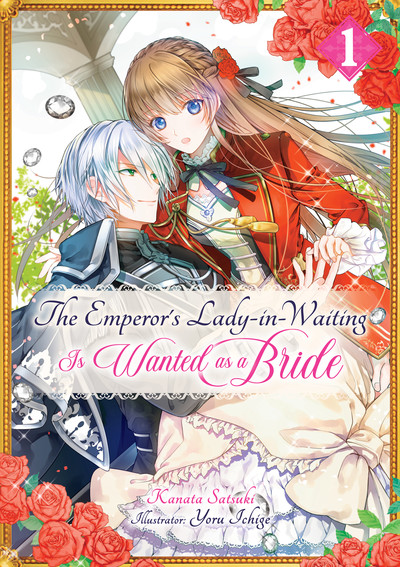 The Emperor's Lady-in-Waiting Is Wanted as a Bride. Story by Kanata Satsuki, art by Yoru Ichige. J-Novel
Club, $6.99 digital.
The Emperor's Lady-in-Waiting Is Wanted as a Bride. Story by Kanata Satsuki, art by Yoru Ichige. J-Novel
Club, $6.99 digital.
Synopsis:
In her past life, Lyse was Qatora, a lady knight protecting the crown prince and his cousin. She died
being pulled into the divine light that gives the land of Razanate its magic and its nobles their incredible
longevity. That caused her to learn the truth of the light, and so when she was reborn one hundred
years later in a different kingdom, she decided that the (potentially blasphemous) knowledge meant
that she could never go back. Her determination is challenged when the emperor and two of his
retainers come to visit the palace. They immediately sense something about Lyse, and the next thing she
knows, she's engaged to Sir Sidis. He doesn't really want to marry her for herself, right…?
Rating:
(Rebecca Silverman)
The Emperor's Lady-in-Waiting Is Wanted as a Bride comes to use from the same author as I Refuse to
be Your Enemy, and rather than that signaling a rehash of the previous series, that means that this book
is rather better written than most similar light novels. Kanata Satsuki is a good enough writer to give the
story more heft than you might expect, as well as to imbue the characters with more than one or two
defining tropes as traits. It still follows the basic light novel formula, but it's also a much better book
than you might expect from the title.
It does, however, share one major plot device with Satsuki's other work: this is a reincarnation story. But rather than Lyse having come from another world, she's just from one hundred years ago in a neighboring kingdom. That means that Lyse, retaining all of her memories from when she was Qatora, is only struggling to keep any forbidden or dangerous knowledge that she had as a knight guarding the imperial children, not adjusting to an entirely new world. Mostly she's just kind of sad – not only did she die protecting those children (and in front of one of them, the one who was the most attached to her), but in the kingdom she now lives in, women are expected to be sweet and permissive and all the things Lyse is not. She resigns herself to never marrying and basically to never being happy, still trying to stay true to who she is and how she wants to live as much as she can.
The title of the book comes into play when the emperor, who was one of the kids she watched over back in the day (nobles are incredibly long-lived in Razanate), comes to visit. Lyse is selected as one of his ladies-in-waiting by Sidis, a knight in his service, because he senses something special in her. Almost immediately thereafter, Sidis proposes to Lyse, and she spends most of the book under the assumption that he just wants the whatever-makes-her-special that he sensed, rather than Lyse herself. Meanwhile, someone is warping the mana of the Razanate contingent, the emperor gets turned into a dog, and Lyse and Sidis try to figure out what is going on and how it's linked to a highly suspicious and popular new religion. Nothing is too terribly difficult to figure out, but it's fun to read about, and between the romance plot and the fantasy adventure, there's a nice variety of moods.
The ending is pretty final, and I'm not sure if there's going to be any more volumes. Either way, this is a satisfying read.
discuss this in the forum (52 posts) |
this article has been modified since it was originally posted; see change history
back to The Spring 2021 Manga Guide
Feature homepage / archives